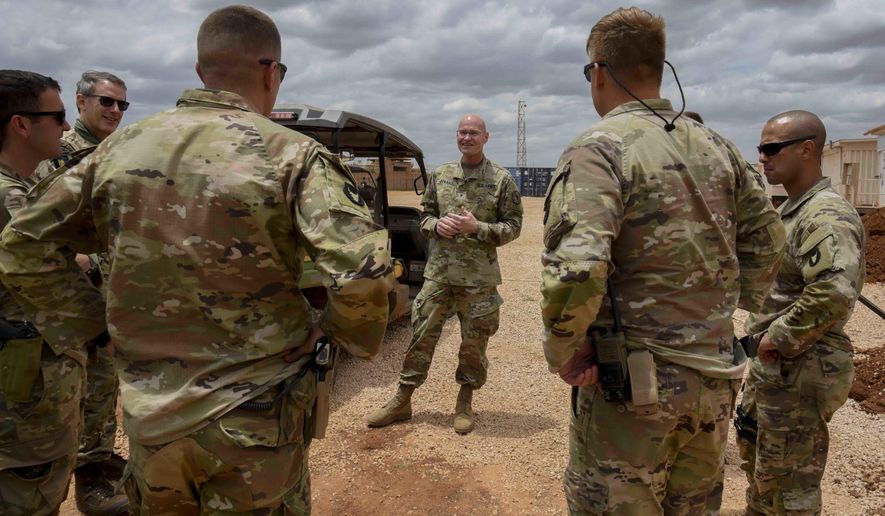President Trump on Friday ordered that a “majority” of the 700 U.S. troops stationed in Somalia be relocated by early next year, Pentagon officials said, signaling a shift in how the U.S. wages war against the al-Shabab terror network and accelerating a trend of American military reconfiguration around the world.
It’s unclear exactly how many troops will remain in Somalia. The Defense Department seemed to suggest that nearly all forces will be reassigned elsewhere in Africa or to other bases in the region.
Despite the move, officials stressed that the U.S. remains committed to its anti-terror mission and is by no means abandoning the fight against al-Shabab or other extremist organizations operating in the Horn of Africa.
“The U.S. is not withdrawing or disengaging from Africa. We remain committed to our African partners and enduring support through a whole-of-government approach,” the Pentagon said in a statement. “While a change in force posture, this action is not a change in U.S. policy. We will continue to degrade violent extremist organizations that could threaten our homeland while ensuring we maintain our strategic advantage in great power competition.
“As a result of this decision, some forces may be reassigned outside of East Africa,” the statement continued. “However, the remaining forces will be repositioned from Somalia into neighboring countries in order to allow cross-border operations by both U.S. and partner forces to maintain pressure against violent extremist organizations operating in Somalia.”
The announcement comes amid other major U.S. drawdowns in Afghanistan and Iraq. Total U.S. troop presence in each country will be down to 2,500 by Jan. 15, five days before presumptive President-elect Joseph R. Biden takes office.
Those drawdowns have met with fierce resistance on Capitol Hill, including from leading Republicans who argue that the U.S. may be opening the door to a resurgence of groups such as al Qaeda and the Islamic State.
In Somalia, the change in U.S. force posture could have immediate effects. Al-Shabab, an al Qaeda affiliate, already is estimated to control as much as 25% of Somali territory.
A U.S. drone war against the group has largely kept it in check and prevented al-Shabab militants from overrunning the capital of Mogadishu or seizing control of other strategically vital areas. The U.S. also trains and advises Somali troops — though specialists have warned that those troops are by no means ready to battle al-Shabab on their own.
The American drawdown likely will be cast by al-Shabab as a major victory over the West and almost surely will provide a huge boost to morale and recruiting.
The Pentagon announcement also comes just weeks before Somalia is expected to hold presidential and parliamentary elections. Specialists have warned that a major U.S. move could put those elections in jeopardy.
Critics say the elections are just one potential casualty of the move, with the other being the potential loss of U.S. influence to China, its chief global competitor.
“With upcoming elections in Somalia and conflict raging in neighboring Ethiopia, abandoning our partners could not come at a worse time,” Rep. Jim Langevin, Rhode Island Democrat, said in a statement. “Al-Shabab will message our withdrawal as a victory, which may propel some of their political affiliates into government. All the while, China will seize the opportunity to build their influence in the region, to the detriment of those who care about representative governance and equality.”
But military officials argued that the U.S. will remain able to target and contain terrorist forces, suggesting that drone strikes will continue as they have throughout the Trump administration.
“The U.S. will retain the capability to conduct targeted counterterrorism operations in Somalia, and collect early warnings and indicators regarding threats to the homeland,” the Pentagon said in its statement.
Some analysts argued that the drawdown represents a realization that the U.S. can no longer commit itself to open-ended conflicts in historically chaotic countries across the Middle East and Africa.
“The nation’s two decades of seemingly endless counterterrorism wars show that staying until there are zero potential terrorists on the ground means never leaving,” said Benjamin Friedman, policy director at the think tank Defense Priorities, which advocates more limited U.S. intervention abroad.
“Staying until countries long-ravaged by civil war are stable means staying indefinitely,” he said.
• Ben Wolfgang can be reached at bwolfgang@washingtontimes.com.




Please read our comment policy before commenting.